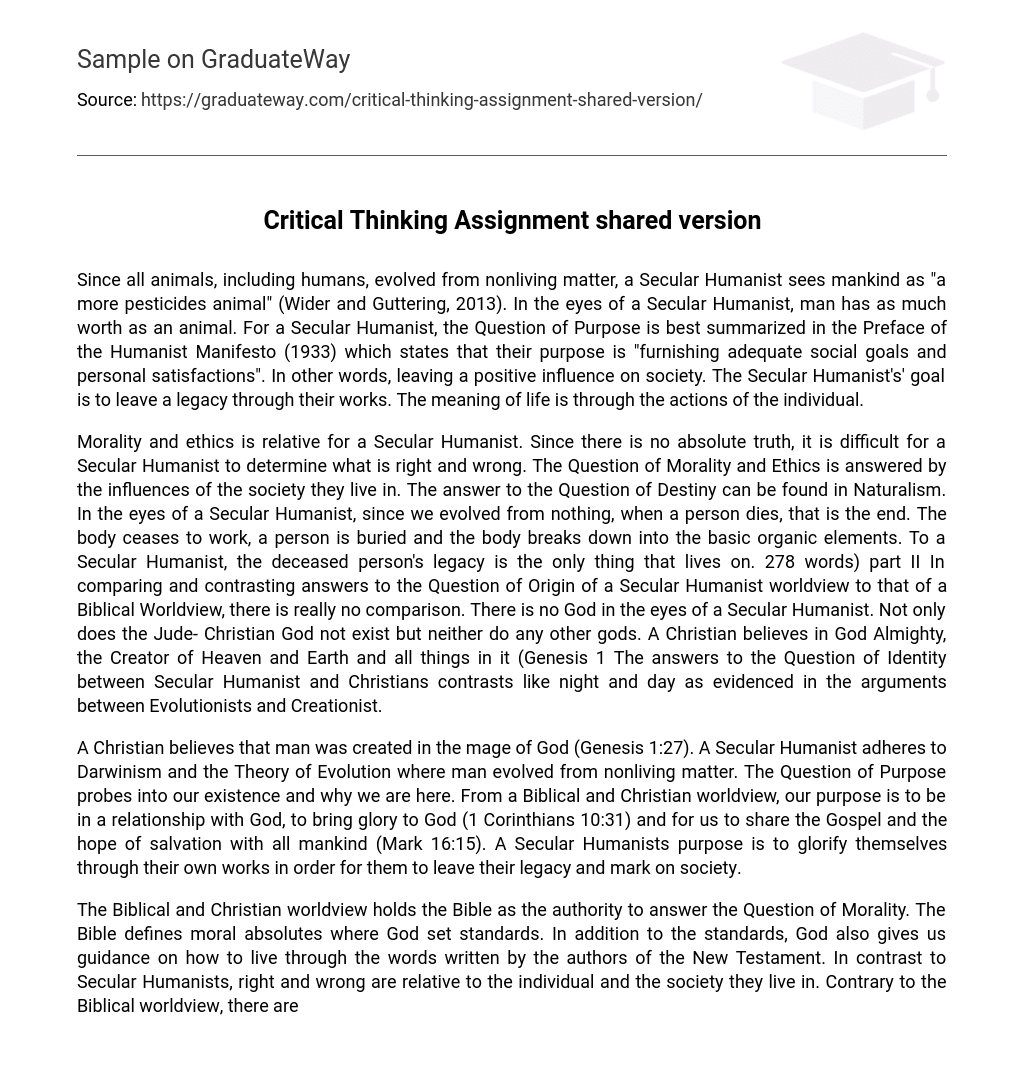Since all animals, including humans, evolved from nonliving matter, a Secular Humanist sees mankind as “a more pesticides animal” (Wider and Guttering, 2013). In the eyes of a Secular Humanist, man has as much worth as an animal. For a Secular Humanist, the Question of Purpose is best summarized in the Preface of the Humanist Manifesto (1933) which states that their purpose is “furnishing adequate social goals and personal satisfactions”. In other words, leaving a positive influence on society. The Secular Humanist’s’ goal is to leave a legacy through their works. The meaning of life is through the actions of the individual.
Morality and ethics is relative for a Secular Humanist. Since there is no absolute truth, it is difficult for a Secular Humanist to determine what is right and wrong. The Question of Morality and Ethics is answered by the influences of the society they live in. The answer to the Question of Destiny can be found in Naturalism. In the eyes of a Secular Humanist, since we evolved from nothing, when a person dies, that is the end. The body ceases to work, a person is buried and the body breaks down into the basic organic elements. To a Secular Humanist, the deceased person’s legacy is the only thing that lives on. 278 words) part II In comparing and contrasting answers to the Question of Origin of a Secular Humanist worldview to that of a Biblical Worldview, there is really no comparison. There is no God in the eyes of a Secular Humanist. Not only does the Jude- Christian God not exist but neither do any other gods. A Christian believes in God Almighty, the Creator of Heaven and Earth and all things in it (Genesis 1 The answers to the Question of Identity between Secular Humanist and Christians contrasts like night and day as evidenced in the arguments between Evolutionists and Creationist.
A Christian believes that man was created in the mage of God (Genesis 1:27). A Secular Humanist adheres to Darwinism and the Theory of Evolution where man evolved from nonliving matter. The Question of Purpose probes into our existence and why we are here. From a Biblical and Christian worldview, our purpose is to be in a relationship with God, to bring glory to God (1 Corinthians 10:31) and for us to share the Gospel and the hope of salvation with all mankind (Mark 16:15). A Secular Humanists purpose is to glorify themselves through their own works in order for them to leave their legacy and mark on society.
The Biblical and Christian worldview holds the Bible as the authority to answer the Question of Morality. The Bible defines moral absolutes where God set standards. In addition to the standards, God also gives us guidance on how to live through the words written by the authors of the New Testament. In contrast to Secular Humanists, right and wrong are relative to the individual and the society they live in. Contrary to the Biblical worldview, there are no absolute truths or morals in the relativist views of Secular Humanism. The answers to the Question of Destiny contrasts between Secular Humanist and Biblical worldviews.
Whereas Christians believe that the soul will spend n eternity in Heaven or Hell when the physical body dies; death is the end of everything for a Secular Humanist. For a Secular Humanist, the influences and legacy left behind is their way of continuing to live. For a Christian, if we accept Jesus Christ as our Lord and Savior and believe that He died for our sins, then we shall be saved from hell and eternal death and will live in the glory of God in Heaven. (395 words)





